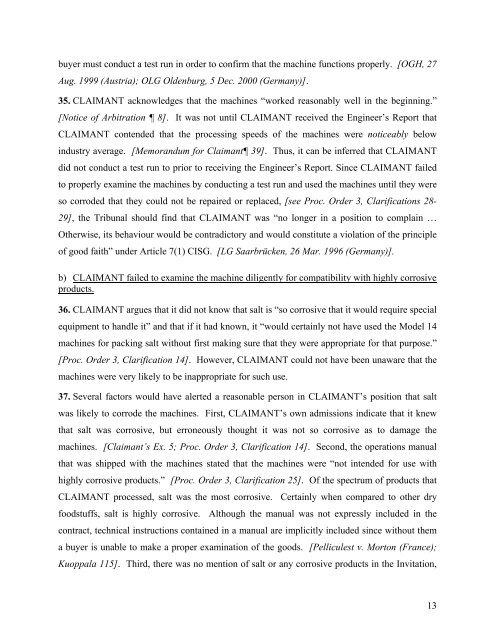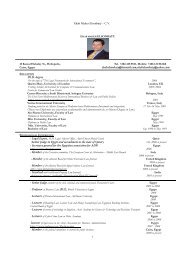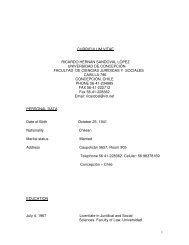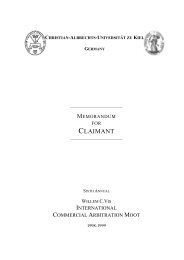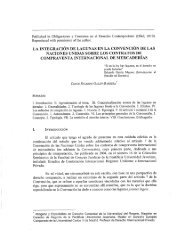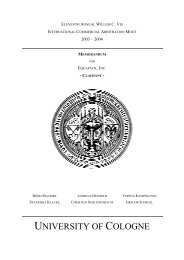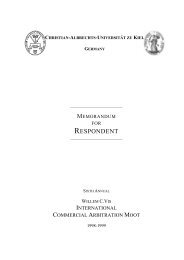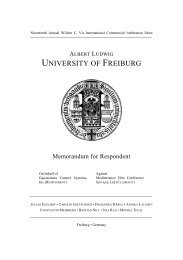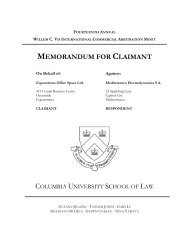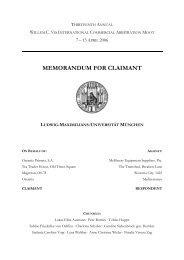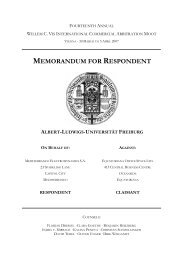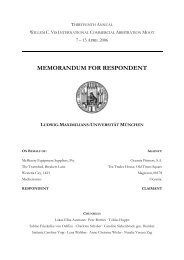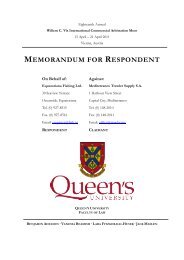Equapack, Inc. v. Medi-Machines S.A. Memorandum for Medi ...
Equapack, Inc. v. Medi-Machines S.A. Memorandum for Medi ...
Equapack, Inc. v. Medi-Machines S.A. Memorandum for Medi ...
You also want an ePaper? Increase the reach of your titles
YUMPU automatically turns print PDFs into web optimized ePapers that Google loves.
uyer must conduct a test run in order to confirm that the machine functions properly. [OGH, 27<br />
Aug. 1999 (Austria); OLG Oldenburg, 5 Dec. 2000 (Germany)].<br />
35. CLAIMANT acknowledges that the machines “worked reasonably well in the beginning.”<br />
[Notice of Arbitration 8]. It was not until CLAIMANT received the Engineer’s Report that<br />
CLAIMANT contended that the processing speeds of the machines were noticeably below<br />
industry average. [<strong>Memorandum</strong> <strong>for</strong> Claimant 39]. Thus, it can be inferred that CLAIMANT<br />
did not conduct a test run to prior to receiving the Engineer’s Report. Since CLAIMANT failed<br />
to properly examine the machines by conducting a test run and used the machines until they were<br />
so corroded that they could not be repaired or replaced, [see Proc. Order 3, Clarifications 28-<br />
29], the Tribunal should find that CLAIMANT was “no longer in a position to complain …<br />
Otherwise, its behaviour would be contradictory and would constitute a violation of the principle<br />
of good faith” under Article 7(1) CISG. [LG Saarbrücken, 26 Mar. 1996 (Germany)].<br />
b) CLAIMANT failed to examine the machine diligently <strong>for</strong> compatibility with highly corrosive<br />
products.<br />
36. CLAIMANT argues that it did not know that salt is “so corrosive that it would require special<br />
equipment to handle it” and that if it had known, it “would certainly not have used the Model 14<br />
machines <strong>for</strong> packing salt without first making sure that they were appropriate <strong>for</strong> that purpose.”<br />
[Proc. Order 3, Clarification 14]. However, CLAIMANT could not have been unaware that the<br />
machines were very likely to be inappropriate <strong>for</strong> such use.<br />
37. Several factors would have alerted a reasonable person in CLAIMANT’s position that salt<br />
was likely to corrode the machines. First, CLAIMANT’s own admissions indicate that it knew<br />
that salt was corrosive, but erroneously thought it was not so corrosive as to damage the<br />
machines. [Claimant’s Ex. 5; Proc. Order 3, Clarification 14]. Second, the operations manual<br />
that was shipped with the machines stated that the machines were “not intended <strong>for</strong> use with<br />
highly corrosive products.” [Proc. Order 3, Clarification 25]. Of the spectrum of products that<br />
CLAIMANT processed, salt was the most corrosive. Certainly when compared to other dry<br />
foodstuffs, salt is highly corrosive. Although the manual was not expressly included in the<br />
contract, technical instructions contained in a manual are implicitly included since without them<br />
a buyer is unable to make a proper examination of the goods. [Pelliculest v. Morton (France);<br />
Kuoppala 115]. Third, there was no mention of salt or any corrosive products in the Invitation,<br />
13


